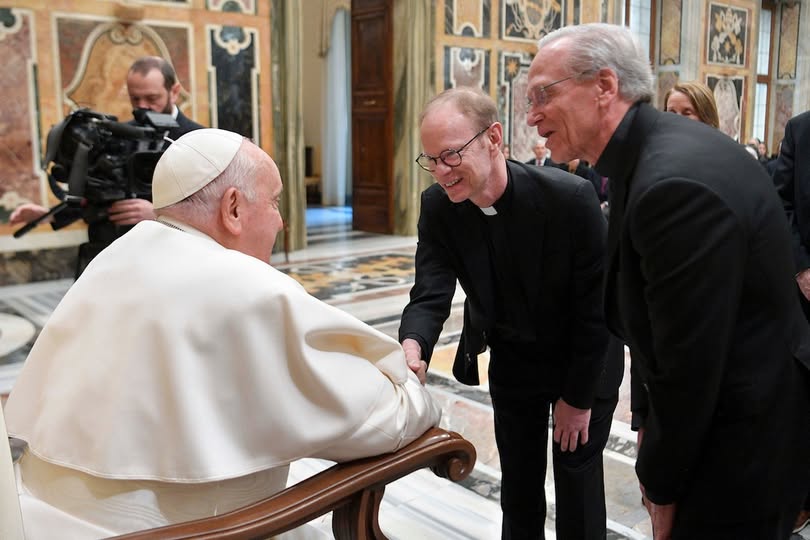
February 1, 2024; University of Notre Dame leadership, led by President Rev. John I. Jenkins, C.S.C. and President-elect Rev. Robert Dowd, C.S.C., meet with Pope Francis at the Vatican. (photo provided by Vatican Media)
The news of the passing of Pope Francis has reverberated through the hearts of millions worldwide, leaving a profound sense of loss. Pope Francis, the 266th Pope of the Roman Catholic Church, was a global spiritual leader who reshaped the way the Church interacted with the world. His sudden death marks the end of a remarkable era of papacy that spanned over a decade and left an indelible mark on both the Church and the world at large.
The Pope’s Legacy
Pope Francis, born Jorge Mario Bergoglio in Buenos Aires, Argentina, in 1936, became the first Jesuit Pope and the first from the Southern Hemisphere when he ascended to the papacy in 2013. He was elected as the successor to Pope Benedict XVI, who had made the unprecedented decision to resign, citing health concerns. From the moment of his election, Pope Francis sought to reorient the Church, not around its hierarchy and wealth but around a focus on humility, service, and compassion for the marginalized.
Under his leadership, Pope Francis revitalized the image of the Church. His commitment to social justice, dialogue, and interfaith relations positioned him as a prominent voice on critical issues such as poverty, climate change, migration, and the global refugee crisis. He embodied the teachings of Jesus Christ in his simple yet powerful acts of service, such as washing the feet of prisoners and reaching out to the sick and the needy.
He spoke consistently about the need for the Church to reach out to those on the periphery of society, embracing those who often felt excluded by traditional Church teachings or institutions. In his efforts to build bridges between different faiths, he was a champion of interfaith dialogue, meeting with leaders of other religions and advocating for peace and understanding in the face of increasing religious tensions worldwide.
Pope Francis’s approach to the papacy was a departure from the more traditional, conservative approach of his predecessors. His papacy was marked by efforts to modernize the Church and make it more responsive to contemporary issues. His vision for the Church was one that embraced mercy and compassion, emphasized environmental stewardship, and advocated for the poor and marginalized. These values were evident in his encyclicals, such as Laudato Si’, in which he called for urgent action on climate change, and Amoris Laetitia, which emphasized the importance of love, family, and mercy in contemporary society.
Pope Francis’s focus on the environment also earned him admiration beyond the religious community. His teachings on environmental justice helped to catalyze global conversations on climate change and environmental degradation, underscoring the interconnectedness of all people and the planet. His famous quote, “The Earth, our home, is beginning to look more and more like an immense pile of filth,” encapsulated his impassioned plea for global leaders and citizens alike to take urgent steps to address the ecological crisis.
Furthermore, his pontificate was characterized by a recognition of the need for the Church to confront its past mistakes. Pope Francis was unafraid to address difficult and sensitive issues within the Church, including the sexual abuse scandal that had long plagued its reputation. He took significant steps to acknowledge the pain and suffering of victims, instituting reforms within the Vatican and taking steps to hold accountable those responsible for abuse. This was a delicate and painful journey, but Pope Francis’s transparency and willingness to engage with the suffering of others won him both praise and criticism, as he confronted the sins of the Church head-on.
Pope Francis at Notre Dame: A Symbol of Unity
The news of Pope Francis’s passing has been met with widespread mourning, including at the University of Notre Dame, a prominent institution with strong Catholic roots. Notre Dame has long been a symbol of the Catholic Church’s academic, spiritual, and social missions. As a Catholic university, Notre Dame’s community has always embraced the principles of faith, service, and justice that Pope Francis espoused throughout his papacy.
For many members of the Notre Dame community—students, faculty, alumni, and staff—the Pope’s passing represents the loss of a spiritual and moral guide who was committed to addressing the most pressing global issues with compassion and wisdom. The connection between Notre Dame and Pope Francis was evident in the Pope’s public remarks and in the institution’s ongoing commitment to social justice and education. The University of Notre Dame has long been a place where students are encouraged to engage with the world’s challenges, and Pope Francis’s teachings aligned closely with these values.
Notre Dame’s commitment to social justice and the common good reflected the spirit of Pope Francis. The Pope’s message about the importance of empathy, respect, and care for those on the margins of society resonated deeply with many within the Notre Dame community, who have sought to live out those values through their academic and service endeavors. Pope Francis’s advocacy for a “culture of encounter”—one where individuals from all walks of life engage with one another and grow through shared experiences—was echoed in the way Notre Dame’s diverse community has strived to engage with the world and bridge divides, whether they be racial, economic, or ideological.
In moments of personal reflection and collective prayer, members of the Notre Dame community have always looked to the Pope as a source of inspiration. His tireless efforts to promote peace, compassion, and reconciliation have inspired students to pursue careers in social justice, medicine, education, law, and politics, with a deep sense of moral responsibility and commitment to the common good.
The Church and the World Mourn
The passing of Pope Francis marks not just the loss of a global leader but the end of a unique papacy that was both pastoral and prophetic. His role as the shepherd of the Catholic Church was underscored by a deep commitment to the faithful, but his influence also extended far beyond the borders of the Church. World leaders, religious figures, and ordinary people alike mourn the loss of a leader who reminded them of the importance of mercy, humility, and solidarity.
Pope Francis’s death is a reminder of the fragile nature of life and the inevitability of change, even within the most enduring institutions. However, his legacy will continue to inspire countless individuals and organizations to live out his vision of a world that values justice, peace, and care for creation.
In mourning his passing, the Catholic Church and the world are not only grieving the loss of a Pope but celebrating the profound impact he made during his time on Earth. His leadership demonstrated that the Church could be both a beacon of hope and a force for social change in a world desperately in need of healing.
The Future of the Church
As the Catholic Church moves forward in the wake of Pope Francis’s death, the question of his successor looms large. The College of Cardinals will soon convene to elect a new pope, and there is no doubt that the next pontiff will face a world that has been forever altered by the leadership of Pope Francis. The Church will continue to confront many of the same challenges that Pope Francis grappled with—poverty, injustice, climate change, and religious intolerance—and the faithful will look to his successor to carry forward his mission of compassion and global responsibility.
Pope Francis’s death is a moment of deep reflection for the Church, but it is also an invitation to continue his work. The values he espoused—mercy, justice, and care for the poor and the planet—remain as relevant as ever. The Notre Dame community, along with the rest of the world, will continue to honor his memory by striving to live out those values in their own lives, work, and service to others.
As the Church and the world mourn the passing of Pope Francis, we are reminded of the profound impact one individual can have on the course of history. His influence transcended borders, and his message of love, mercy, and solidarity will continue to guide us in the years to come.





